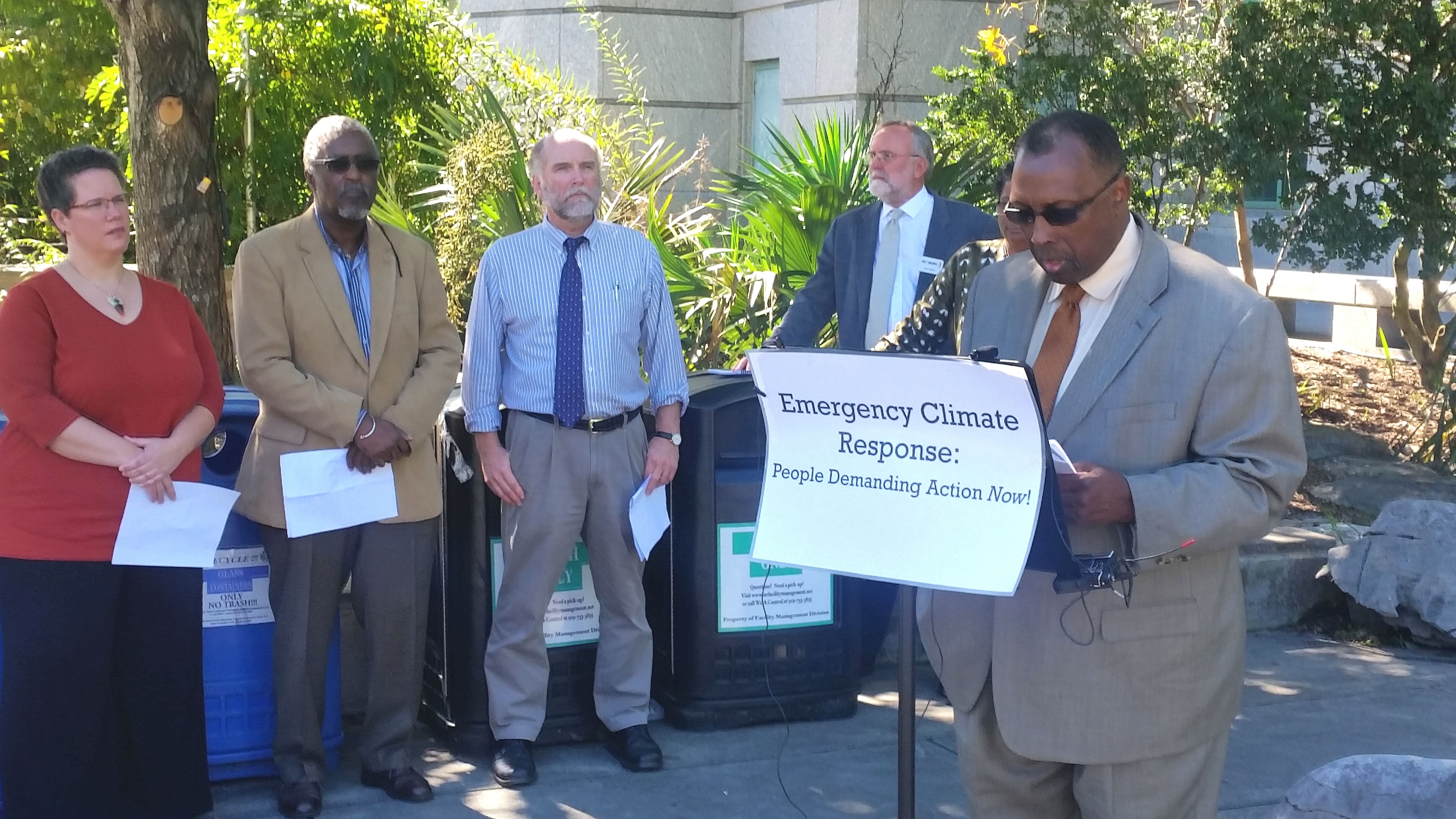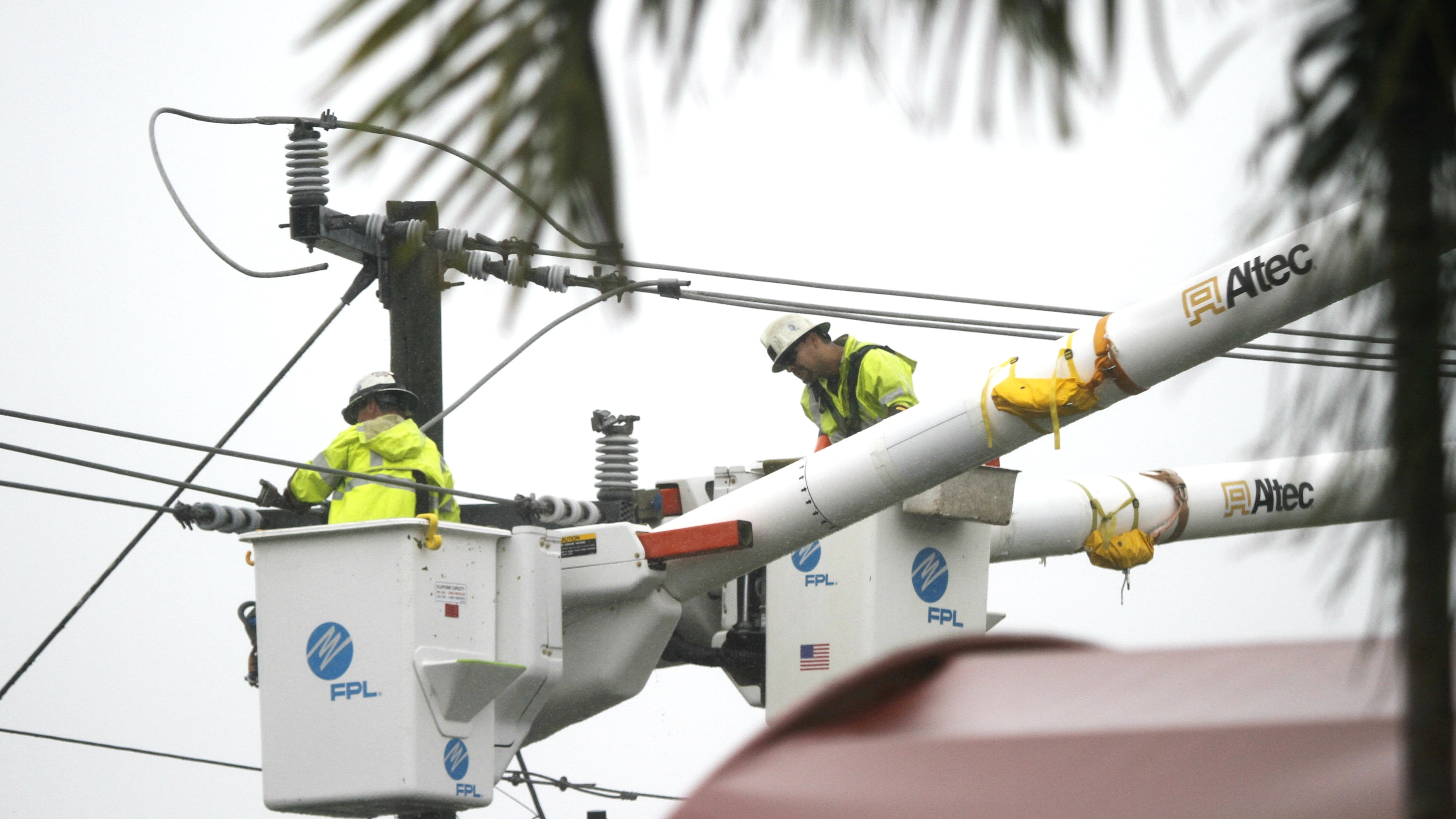This story was originally published by Floodlight, a nonprofit newsroom that investigates the powerful interests stalling climate action, and Capital B, a nonprofit news organization that centers Black voices, audience needs and experiences, and partners with the communities it serves.
Former Florida state Rep. Joe Gibbons sat in the library of the Faith Community Church in Greensboro, North Carolina, trying to convince its pastor to quit promoting rooftop solar.
With a lobbyist’s charm, Gibbons told the Rev. Nelson Johnson that rooftop solar, which allows customers to generate their own renewable electricity, was bad for people of color. Gibbons argued that it creates an imbalance in which those without solar panels end up subsidizing those who have them, Johnson recalled in an interview with Floodlight.
Johnson, a civil rights stalwart who was stabbed by a member of the Ku Klux Klan in 1979, had trouble believing him.
“It felt like he was an employee of Duke,” Johnson said of Gibbons, referencing his state’s power company. Johnson rejected the overture.
At the time Gibbons met Johnson in 2015, Duke Energy was opposing a state bill that would have allowed anyone to install solar panels and sell electricity directly to consumers. Johnson was at the center of a legal battle over just such a third-party solar project planned for his church.
Gibbons wasn’t a Duke employee — not directly anyway. He founded a tax-exempt group called the Energy Equity Alliance; little information about its finances are available. But it was closely aligned — through two board members and Gibbons’ wife, Ava Parker — with NetCommunications, a Black-owned consulting firm. That year, NetCommunications was paid $750,000 by the Edison Electric Institute (EEI), a powerful utility trade group to which Duke belongs, for “consulting.” Duke did not respond to requests for comment.
Gibbons denied receiving funding from any utility in an interview with Floodlight and Capital B. But tax records and leaked internal documents confirm that a separate tax-exempt group he founded in 2018 received $2.8 million from a network of tax-exempt groups controlled by power company consultants. He later declined to answer specific questions about his industry ties.

Johnson wasn’t the only Black leader Gibbons pitched, according to recordings of his public statements. More than two dozen Black civil rights leaders in the Southeast have been high-value targets in power companies’ battle for market dominance, courted and at times even co-opted by the industry, according to an investigation by Floodlight and Capital B.
The multibillion-dollar power companies use Black support to divert attention from the environmental harms that spew from their fossil fuel plants, the investigation found, harms which disproportionately fall on Black communities. One civil rights leader received power company cash as he built support for its attempted takeover of a smaller municipal utility in Florida. Another fought state oversight in Alabama that could have lowered electric bills and federal oversight that could have restricted emissions and pollution from coal burning power plants.
Some civil rights and faith leaders “will sell you out because they’ll sell anything — they’ll sell sea water,” said the Rev. Michael Malcom, executive director of the environmental justice organization Alabama Interfaith Power & Light in Birmingham.
“But there are others who are earnest and trying to survive … and it causes them to make some bad decisions. And there is a whole ‘nother group that is just ignorant to the idea [of environmental justice] and will sell you out due to that ignorance.”
How valuable was this tie between Southern utility companies and civil rights groups? In 2018, Alabama Power was paying a contractor nearly $1.5 million a year to, among other things, “provide ongoing direct relations” with the Southern Christian Leadership Conference, a civil rights group founded by the Rev. Martin Luther King Jr., according to a leaked copy of the contract.
Stealth effort targets renewable energy
Gibbons’ 2015 conversation with Johnson was part of a broader campaign implemented by trade group EEI to slow technologies such as rooftop solar.
Edison Electric Institute spokesperson Brian Reil defended his organization’s actions, saying they are aimed at protecting low-income ratepayers.

“EEI has no issue with rooftop solar,” Reil said in a written statement. “EEI has an issue with poorly designed … policies that overcompensate private rooftop solar system owners at the expense of other customers.”
He cited a new study by the National Academy of Sciences which found that the price of electricity remains relatively stable when the adoption of rooftop solar panels is low — currently just 1 percent nationwide and below 5 percent in all but four states — but it may rise as participation rates grow.
Consultants working for the powerful industry trade group were behind the formation of Gibbons’ organization.
On a leaked 2014 EEI conference call, an employee of consulting firm NetCommunications teased a forthcoming report to be published by the Energy Equity Alliance, a tax-exempt group that appears to not have been incorporated yet. The group was formed a month later in Florida with Gibbons as its director. During his four years at its helm, Gibbons lobbied for restrictions on rooftop solar in South Carolina, rallied Black federal legislators against the technology, and traveled the country “educating” ministers and civil rights leaders about rooftop solar.
And in 2018, Gibbons was working with Floridians for Affordable Reliable Energy, the tax-exempt group that got $2.8 million from groups operated by Alabama-based power company consultants Matrix LLC. In that effort, Gibbons whipped up opposition among Florida civil rights groups to a ballot initiative that would have introduced competition into Florida’s monopoly energy markets.
Floridians for Affordable Reliable Energy filed a friend of the court brief with the Florida Supreme Court arguing the measure would “significantly increase electricity costs for seniors, low income households, minority communities, average citizens and small businesses in Florida.”
Several chapters of The Urban League, a civil rights group, also signed on with Gibbons. Richard Danford, the president of Jacksonville’s Urban League chapter, says Gibbons was instrumental in securing funding for the chapter when it was struggling in 2019. The court ultimately struck the amendment down, finding its language confusing.
In a terse interview, Gibbons confirmed he “did some energy stuff” and “got involved with different advocacy groups.” And he says he still stands by the utility-aligned policies he advocated.
Utilities tap consulting companies
The joint investigation found that since at least 2009, consulting companies have worked on behalf of major power companies seeking to influence Black leaders and their organizations. They worked primarily through 501(c) 4 organizations, tax-exempt groups that are allowed to engage in political activity.
Two of the nation’s largest power companies, NextEra Energy and Southern Company, employed Matrix LLC, whose tactics included secretly funneling money to news sites that attacked clean energy proponents, surveilling a journalist who wrote critically about FPL and employing a corporate operative posing as a reporter to rattle political opponents.

Matrix’s founder, Joe Perkins, has maintained that its former CEO, Jeff Pitts, was a “rogue employee” who performed much of the work without Perkins’ knowledge. In court filings, Pitts has alleged that his boss was aware and has accused Perkins of wrongdoing. Neither responded to multiple requests for comment.
Entities controlled by Matrix paid $115,000 to Charles Steele Jr, the head of the Southern Christian Leadership Conference (SCLC), and about $170,000 to Rev. Deves Toon, national field director for the National Action Network (NAN), according to verified internal Matrix documents and tax records.
The SCLC was a desegregation pioneer in the South and active in the first protests against environmental racism. NAN, founded by the Rev. Al Sharpton, spotlights violence faced by people of color. In 2023, President Joe Biden, Vice President Kamala Harris, and the leader of the Environmental Protection Agency spoke at NAN events.
In an interview last year, Steele confirmed one payment from Matrix but categorized it as a contribution for civil rights work. Neither he nor his organization responded to additional questions. Toon did not respond to multiple requests for comment.
As he received the payments, NAN’s Toon built support for NextEra subsidiary Florida Power & Light’s attempted takeover of a smaller public utility in Florida. His actions on behalf of Matrix have prompted questions from the FBI, according to two people interviewed by investigators, the news outlets’ joint investigation found. NextEra Energy did not respond to requests for comment.
Steele, the SCLC head, fought state utility oversight in Alabama. And he advocated for less federal oversight that could have restricted emissions from Alabama Power’s coal-burning power plants and pollution from its toxic coal-ash ponds.
‘We spread money all over the Southeast’
Southern Company CEO Tom Fanning, who retired last year, confirmed in a May interview with Floodlight that the company still worked with Matrix and with civil rights groups including the SCLC. The company did not respond to later requests for comment.
“There’s a real business reason why we do this,” he said, claiming a mutual benefit for the company and the civil rights groups.

In an earlier interview with Floodlight, Fanning said the company’s related charitable foundations used their $600 million in assets to “spread money all over the Southeast. … we make it a point to be invested in the communities.”
At least one venerable civil rights organization — the NAACP — urged its local chapters to stop taking power company money in 2020 after an internal struggle sparked by donations from Florida Power & Light. But big dollar corporate sponsorship can be hard to resist as such donations are hard to come by for social justice nonprofits, according to an analysis by CauseIQ, which provides information to companies that fund the nonprofit sector.
Power company money and attention helps to fill the financial void many civil rights groups experience, and in turn, gives utilities a trusted community leader to advocate for them on lucrative policy positions, according to interviews with a dozen Black political operatives, community organizers and consultants.
David Pellow, director of the Global Environmental Justice Project at the University of California at Santa Barbara, says the payments represent “the cold, hard, brutal” facts that power companies “need to maintain (public) support for what they’re doing.”
A “really effective way” of controlling the narrative in favor of utilities, Pellow said, has been “buying off people in communities who have a vested interest in fighting those companies.”
Jasmen Rogers, a Black political strategist in Florida, says the money exchange lays bare the sometimes difficult concessions Black leaders make to help fund their work.
“If Black folks are finding that they can’t get funding from other, better places as easily as other people, how do we reconcile that?” she said.
Esther Calhoun of Uniontown, Alabama, says she is leery of civil rights groups and leaders who take money from utility companies.
Calhoun says she often has to choose between her electric bill, medicine or food. Alabama residents spend more on electric bills than any other state.
“It’s gotten to be where if you’re on a fixed income, there ain’t no way you can pay,” said the 60-year-old, whose monthly utility bill for her small mobile home is $220.
For a time, Calhoun also had to battle a defamation lawsuit filed by the operators of a toxic coal ash dump at a local landfill. The parties settled in 2017, with the landfill operators agreeing to enact better pollution controls.
When civil rights groups take money from industry, she said in an interview, “They don’t speak out, and they end up being on the other side of what they originally said — that’s what corruption gets you.”
Opposition fades as utility support grows
In the past, the SCLC pushed back against Alabama Power, boycotting it for supporting apartheid-era South Africa in 1965. In the early ’80s, the group led the nation’s burgeoning environmental justice movement.
But by the early 2000s, SCLC was in turmoil, facing bankruptcy and internal discord. Steele assumed the presidency 20 years ago, attracting corporate donors. Among them was Georgia Power — Alabama Power’s affiliate — which helped raise $2 million for a new SCLC office.

Five years later, Steele left to become a consultant. He co-founded Working People for Fair Energy, a tax-exempt group, alongside a Matrix employee, according to tax and divorce records.
The group fought regulations on toxic coal ash, a waste product caused by coal-burning power plants. In 2010, Steele received $105,000 from the Partnership for Affordable Clean Energy (PACE), a Matrix-controlled tax-exempt group that helped power companies fight rooftop solar.
In 2012, Steele returned as SCLC president. Over the next five years, he opposed rooftop solar expansion in Arizona, resisted lowering Alabama utility bills, and criticized a federal plan to reduce power plant greenhouse gas emissions.
“My job was to make money for the organization (SCLC),” Steele said in an interview with Floodlight in July.
Perkins, the Matrix founder, told Floodlight in a July 2022 written statement that the assertion that Matrix had “deployed” groups to advocate for certain positions or that these were “front groups” for Matrix is “untrue and offensive.” But it was Perkins himself who, as of 2018, was earning nearly $1.5 million a year from Alabama Power to maintain the company’s relationship with the Southern Christian Leadership Conference and for other services.
As of 2022, Alabama Power continued to financially support the SCLC. A corporate relations officer for the company spoke at the SCLC annual gala that year. “I want to say thank you, thank you to Dr. Steele for allowing us to be partners,” she said.
Takeover bid sparks federal inquiry
Angie Nixon remembers the December evening in 2017 when some 20 residents from Jacksonville, Florida’s Black neighborhoods convened at a community center to express frustration over rates charged by the Jacksonville Electric Authority (JEA), their municipal utility.
The meeting was organized by a group called Fix JEA Now, where she was a director. Toon, national field director for Sharpton’s NAN, was its leader.
Fix JEA Now blamed the municipal utility for buying a stake in a nearby nuclear power station, “resulting in higher prices for customers and valuable dollars flushed down the drain,” according to its defunct website.
But Nixon says she was unaware of Toon’s agenda. By February 2018, he was calling for the sale of the municipal utility to Florida Power & Light, according to email messages shared by Nixon. Nixon, who is now a state representative, was for fixing the municipal power company — but not privatizing it, which could have raised rates. She says she felt duped and quit.
While running Fix JEA now, Toon received about $170,000 from Matrix. He also offered a sitting Jacksonville City Commissioner who was a likely no vote on the utility sale a $250,000 job with a tax-exempt group run by Matrix, according to reporting from the Orlando Sentinel.
Garret Dennis, the commissioner, said Toon made the job offer through Dwight Brisbane, who worked for Fix JEA Now. Dennis remembers becoming suspicious after researching the tax-exempt group, named Grow United, and finding little information available.
The episode prompted inquiries from the FBI, which interviewed both men in 2022, specifically asking Brisbane about his connections to Matrix. The FBI declined to comment. The sale of JEA was ultimately voted down by Jacksonville’s commissioners.
Brisbane says his motives for working at the organization were driven by concern for the community. In February of this year, the utility passed a 175 percent increase to its basic monthly charge and recently proposed another to pay for service improvements and stabilize its debt.
“It falls on deaf ears, man, nobody cares,” said Brisbane. “Those who have to pay for it are like my mom, who’s 75 years old … and on a fixed income, or disabled people.”



